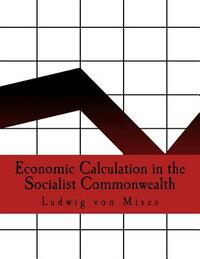Take a photo of a barcode or cover
2 reviews for:
Economic Calculation in the Socialist Commonwealth (Large Print Edition)
Ludwig von Mises
2 reviews for:
Economic Calculation in the Socialist Commonwealth (Large Print Edition)
Ludwig von Mises
informative
slow-paced
challenging
informative
inspiring
reflective
medium-paced
"Economic Calculation in the Socialist Commonwealth" is a seminal work by the Austrian economist Ludwig von Mises, originally published in 1920. The book addresses a fundamental critique of socialist economic planning, particularly focusing on the challenges inherent in the absence of a genuine price mechanism under socialism.
Mises begins by highlighting the role of prices in a market economy as signals that convey crucial information about the relative scarcity of resources and consumer preferences. In a capitalist system, prices are determined through the interaction of supply and demand, reflecting the opportunity costs and values assigned by individuals in their decision-making processes. However, Mises argues that socialism, which advocates for collective ownership of the means of production, lacks a genuine price system due to the absence of private property and market exchanges.
The absence of private ownership and competitive markets in a socialist system, according to Mises, hinders the allocation of resources in an efficient and rational manner. Without market prices to guide decision-making, socialist planners face insurmountable challenges in determining the most beneficial use of resources, coordinating production, and responding to changes in consumer preferences. Mises contends that without a price mechanism, rational economic calculation becomes impossible, leading to inefficiency, waste, and misallocation of resources.
Mises also addresses the notion of a planned economy, arguing that central planning cannot replicate the dynamic and decentralized nature of a market system. He emphasizes the inability of central planners to possess the necessary information to make informed decisions about resource allocation, production levels, and distribution. The complexity of the modern economy, Mises argues, requires decentralized decision-making based on the knowledge dispersed among individuals and entrepreneurs in the market.
In conclusion, "Economic Calculation in the Socialist Commonwealth" is a foundational work that challenges the feasibility of socialist economic planning. Mises argues that the lack of a genuine price mechanism under socialism results in a failure to effectively allocate resources, coordinate production, and respond to consumer preferences. The book remains a classic in the critique of central planning and continues to be influential in discussions about the role of markets in promoting economic efficiency and prosperity.


